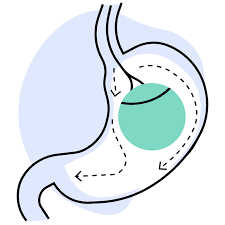Intragastric Balloon Is Estimated To Witness High Growth Owing To Opportunity To Treat Obesity
 |
| Intragastric Balloon Market |
Intragastric balloons are non-surgical and minimally invasive devices used to treat obesity. The balloons are placed endoscopically in the stomach of obese patients to induce early satiety and reduce hunger. The balloons occupy space in the stomach, making the patient feel fuller which leads to reduced food intake. Intragastric balloons have emerged as an effective option for weight loss in overweight and obese patients.
The global Intragastric
Balloon Market is estimated to be valued at US$ 372.6 Mn in 2023 and is
expected to exhibit a CAGR of 9.6% over the forecast period 2023 to 2030, as
highlighted in a new report published by Coherent Market Insights.
Market Opportunity
The rising prevalence of obesity presents a major opportunity for the growth of
the intragastric balloon market. Obesity has become a major public health issue
worldwide due to the adoption of sedentary lifestyles and unhealthy dietary
habits. According to the World Obesity Federation, over 2.8 million people die
each year as a result of being overweight or obese. Intragastric balloons are
increasingly being used as minimally invasive devices to induce weight loss in
obese patients before bariatric surgery or as a primary treatment option for
obesity. The growing obesity rates and the need for effective obesity
management solutions without side effects of medication or risks of surgery
make intragastric balloons an attractive treatment choice. This is expected to
drive the demand for intragastric balloons over the forecast period.
Porter's Analysis
Threat of new entrants: The intragastric balloon market requires substantial
resources and expertise to develop innovative medical devices. These high entry
barriers deter new players.
Bargaining power of buyers: Individual patients have limited bargaining power
due to inelastic demand for obesity treatment. However, large hospitals and
clinics can negotiate with manufacturers on bulk purchase orders.
Bargaining power of suppliers: Key components such as sealing mechanisms and
high-quality polymers have few substitutes. This gives existing suppliers
bargaining leverage over device makers.
Threat of new substitutes: Few substitutes exist for minimally invasive gastric
balloons. Upcoming technologies like endoscopic bariatric procedures pose
competition.
Competitive rivalry: Large players compete on technology, brand reputation and
geographic presence. Small companies differentiate through customer service and
pricing.
SWOT Analysis
Strengths: Non-surgical treatment, quick weight loss, improved weight
management, reimbursement for obesity treatment.
Weaknesses: Invasive procedure, discomfort, risk of obstruction and deflation,
temporary solution.
Opportunities: Rising obesity rates, increase in bariatric procedures, growth
in medical tourism.
Threats: Entry of substitutes, pricing pressure, stringent regulations on new
devices.
Key Takeaways
The global Intragastric
Balloon Market Share is expected to witness high growth over the
forecast period aided by increasing obese population worldwide. Regionally,
North America dominates due to advanced healthcare infrastructure and growing
obesity epidemic. However, Asia Pacific is emerging as a fast-growing region
with improving access to bariatric treatments.
Key players operating in the intragastric balloon market are Allergan (Acquired
by Abbott), Apollo Endosurgery, Reshape Medical, Helioscopie Medical, and Spatz
FGIA. Allergan leads the market with its FDA-approved Orberaintragastric
balloon. Apollo Endosurgery offers the Apollo OverStitch device to aid in
endoscopic placement of intragastric balloons. Reshape launched the ReShape Duo
dual intragastric balloon system approved in Europe and other regions.
North America holds the largest share due to favorable reimbursements, doctor
awareness and patient affinity for early intervention in obesity. The Asia
Pacific region excluding Japan is poised to grow at a double digit CAGR driven
by rising obesity linked diseases and increasing medical tourism from countries
like India, Thailand and Indonesia. Brazil and Mexico also offer significant
potential for demand due to high obesity levels in Latin America.
Key players operating in the intragastric balloon market are Allergan (Acquired
by Abbott), Apollo Endosurgery, Reshape Medical, Helioscopie Medical, Spatz
FGIA, Endalis, Districlass Medical, Lexal, Medicone, Obalon Therapeutics,
Silimed, Medsil, ReShape Lifesciences, EndoArt, MedSil, Semmar. Allergan leads
the market with its FDA-approved Orbera intragastric balloon.
Get More Insights On This
Topic: https://www.pressreleasebulletin.com/intragastric-balloon-market-growing-demand-analysis/



Comments
Post a Comment